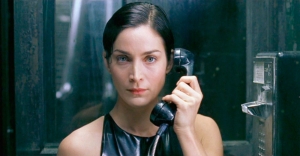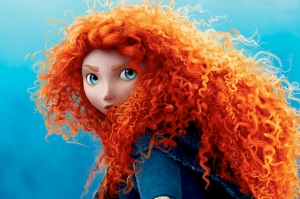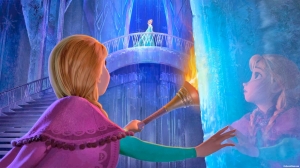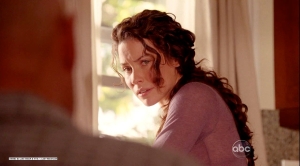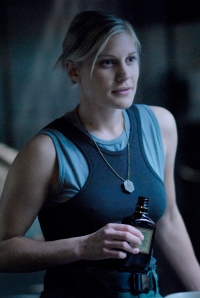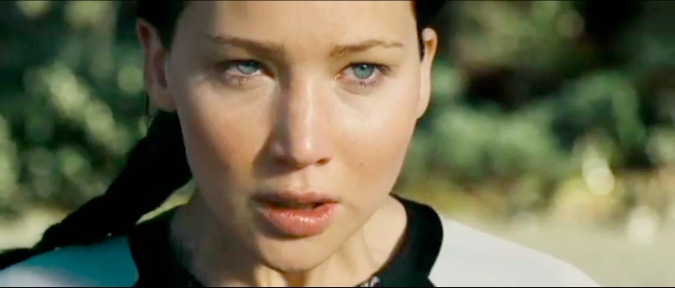This post is in response to an exposition by Tasha Robinson that appeared in The Dissolve on 16 June, 2014. To read the full text of the article, please follow the link: We’re Losing All Our Strong Female Characters to Trinity Syndrome.
A few days ago, a friend’s posted link on Facebook caught my eye. “We’re Losing All Our Strong Female Characters…” it read, and I was unable to see the rest. I thought, “That’s weird, I really thought we were getting better!” Of course, I had to read.
The article, written by The Dissolve‘s Senior Editor Tasha Robinson, bemoans the evidently chronic practice of film-makers to create “Strong Female Characters(TM)” as she calls them, only to throw away their potential in favour of bolstering a male protagonist. I agree, this sounds like a bad thing. I wouldn’t stand for it, personally. Ms. Robinson cites several films in support of her thesis, alluding to “Trinity Syndrome,” which refers to Trinity (Carrie-Anne Moss) from The Matrix trilogy.
First on Ms. Robinson’s list is Valka (Cate Blanchett) in How to Train Your Dragon 2 (2014). Robinson writes, “She’s interesting. Too bad the story gives her absolutely nothing to do.” Now, I haven’t seen How to Train Your Dragon either 1 or 2, but that does sound like a real bummer for the Strong Female Characters(TM) of this world. But then I remembered my post about Frozen from this past February, rejoicing at the gains for, to abbreviate Ms. Robinson, SFCs(TM) in children’s (and especially Disney) films. Has Ms. Robinson see Frozen, I wonder? If so, she is correct that How To Train Your Dragon 2 could represent a depressing (though not wholly unexpected) backslide.
Ms. Robinson proceeds to lambaste The Lego Movie (2014), which evidently builds Wyldstyle (Elizabeth Banks) as a SFC(TM), and then erodes that when she asks her boyfriend’s permission to give the plucky hero reward sex. Next on Ms. Robinson’s list is The Hobbit: The Desolation of Smaug (2013), which evidently invented a new, female elf character simply because there weren’t any girls in the book. To be sure, that does sound like a rather stupid marketing ploy. Finally, Ms. Robinson expresses disgust at the character of Dahl (Katee Sackhoff) in Riddick (2013). Oh, but in the end, Robinson salutes The Edge of Tomorrow (2014) for not falling into that trap*.
One thing my readers may have noticed from my language above is that I have seen none of the movies Ms. Robinson discusses, with the exception of The Matrix (1999). Therefore, I have no basis with which to refute Ms. Robinson’s interpretation of the roles she discusses. Indeed, the way she paints the picture leaves me a bit blue. The problem I am left with, however, is that her hypothesis– that we’re losing our Strong Female Characters(TM) to White Knight Male Protagonists (my term)– leaves me feeling that she must be wrong.
Take her first example, How to Train Your Dragon 2. The series is actually based on a children’s book series by Cressida Cowell. (If you want to read them, check them out!) Now, I’ve never read them, either, but I hear they’re pretty good. My question is, what is Valka like in the books? If she, as Ms. Robinson says, has absolutely nothing to do, then we must look at the book for our criticism. If not, then there is a deeper question as to why film-makers would take a female character’s power away from her. I assume Valka actually exists in the books, unlike Tauriel (Evangeline Lilly), who was invented for the second Hobbit film. That’s pure silliness. The Hobbit is essentially a medieval quest tale. There is no place for women in it, and even as a 10-year-old reading the book for the first time, I understood that and it didn’t bother me. Tauriel is just another sign of how silly Peter Jackson has become about this Hobbit debacle.
Just the fact that The Lego Movie made it into Ms. Robinson’s article is surprising to me. Did she really go looking for a SFC(TM) there? Most reveiwers called it “slapstick” at best. I’m not surprised a formulaic, often crude, movie about little plastic people failed Ms. Robinson on this count. And she had hope for Riddick? I don’t know any women who went to see that. Not even one who was remotely interested. I’m not saying that it’s OK to turn women into sex objects in male-targeted films, but it is certainly more expected. While I hope that will change in the future, one can’t expect miracles to happen overnight.
To Ms. Robinson, I propose the following:
Don’t like How to Train Your Dragon 2 or The Lego Movie? Watch Brave or Frozen. And read the books by Cressida Cowell.
Don’t like the made-up female character in The Hobbit? Read the book. Or watch the same actress, Evangeline Lilly, being kick-ass in Lost.
Don’t like Katee Sackhoff’s character in Riddick? Watch her for 5 seasons of Battlestar Galactica.
My question is, why did Tasha Robinson choose those movies? This year, there have been so many films with Strong Female Characters(TM). How about Black Widow (Scarlett Johansson) in Captain America: The Winter Soldier (2014)? It doesn’t pass the Bechdel test (which in my opinion has a few flaws, though it’s a good start), but Natasha Romanoff definitely fits Ms. Robinson’s SFC(TM) definition. If Ms. Robinson is into movies based on books, how about The Fault in Our Stars (2014) (book by John Green) or The Hunger Games: Catching Fire (2013) (books by Suzanne Collins)? And, high on my list to see soon, Maleficent (2014)? There are so many movies out this year, including action films, that do not support Ms. Robinson’s hypothesis.
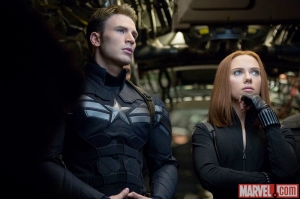
Steve Rogers/Captain America (Chris Evans) and Natasha Romanoff/Black Widow (Scarlett Johansson) in Captain America: The Winter Soldier
Ultimately, I’m glad to report that there is no need for alarm. We are not, as Ms. Robinson suggests, losing our SFCs(TM) to “Trinity Syndrome.” It’s a simple case of Psych 101 Phenomenon. When students in college take Introduction to Psychology, as they learn about each new diagnosis, they become convinced that they suffer from each and every one in turn. Once you start looking for something hard enough, you will find it. Psych 101 phenomenon works on many things. If you’re convinced there’s a spider in your bedroom, you will look until you find one (when you probably wouldn’t have noticed it if you hadn’t been looking). Ms. Robinson was looking for these Trinity Syndrome characters, and she found them.
No need to panic, strong female characters are on the rise, and they work in pairs, ensembles, and solos, both on the silver screen and the small screen. Hollywood really is improving, and there is hope for our daughters and granddaughters.
*In discussing The Edge of Tomorrow, Ms. Robinson says the following: “But there are exceptions to every rule. Edge of Tomorrow features Emily Blunt as Rita, an ultra-tough female character who dies to motivate the male protagonist.(Repeatedly!) She starts off as the biggest bad-ass in her world, but is eventually surpassed by hero William Cage (Tom Cruise), who starts off as a bumbling fuck-up. She mostly exists in the story to provide Cage with information and cheer him on, and eventually validates him with a brief romantic moment. And yet the story doesn’t degrade, devalue, weaken, or dismiss her. It sends the hero on without her at the end—but only at the very end, after she’s proved her worth again and again. She’s tough. She’s confident. She’s desperate. She’s funny. In short, she’s aspirational and inspirational, and just as exciting at the end of the movie as she is at the beginning.” Now, that sounds great. But why does Rita have to die to motivate William? I mean, isn’t that even worse? I understand that dying repeatedly is a part of Edge of Tomorrow‘s premise, but why couldn’t Rita just save the day herself? She has to die (and William has to die until he gets it right) so William can do it? How is that any better? It seems Ms. Robinson’s only concern is that her SFC(TM) is just as interesting at the end of the movie as she was at the beginning. Plus, Tom Cruise gives me the heebeegeebies, especially when we’re talking about women’s rights.
